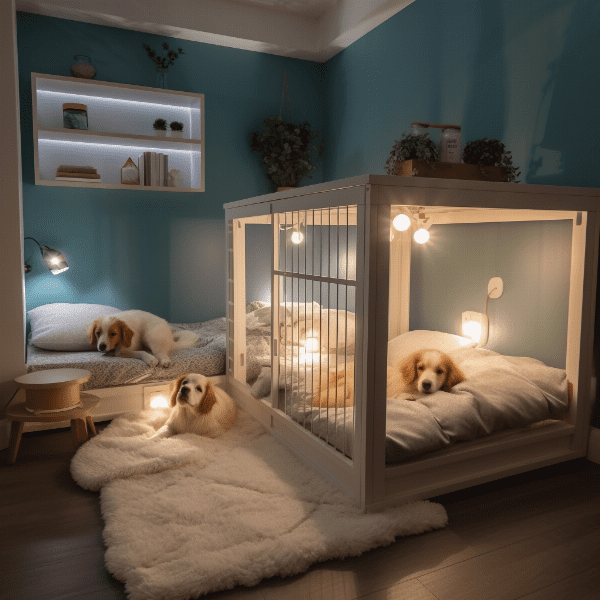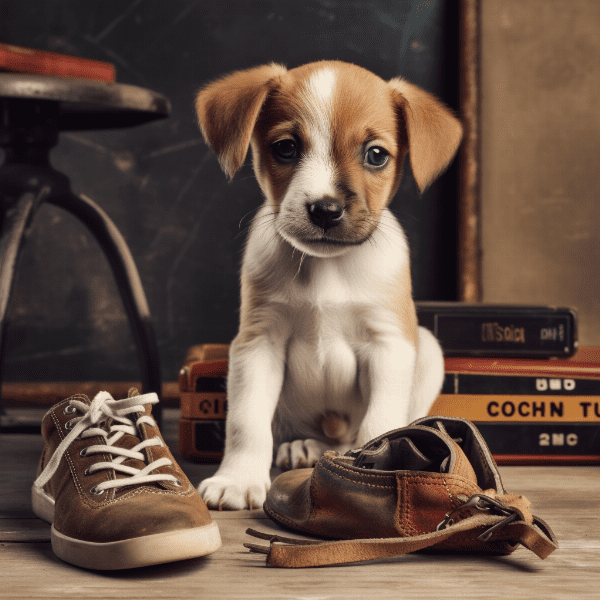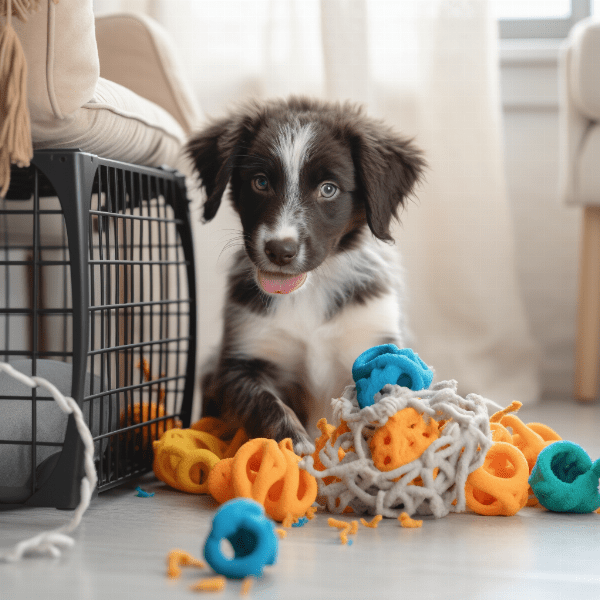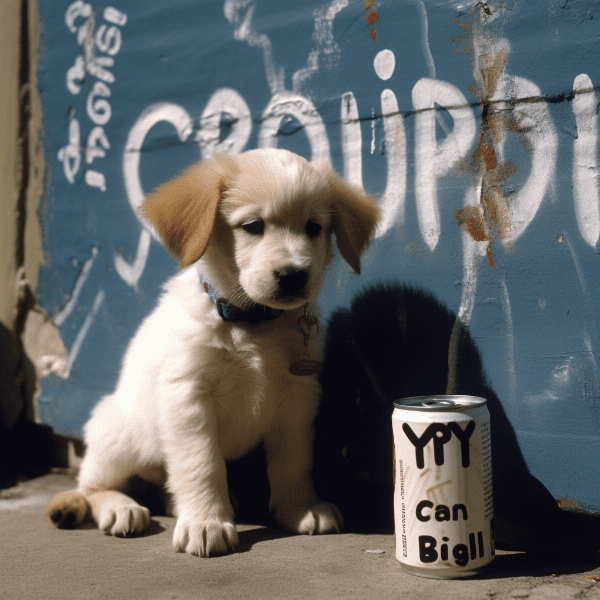Table of Contents
- Understanding Why Puppies Chew Carpet
- Supervising Your Puppy to Prevent Chewing
- Providing Appropriate Chew Toys and Alternatives
- Using Deterrents and Repellents to Stop Chewing
- Positive Reinforcement Training for Good Behavior
- Managing Separation Anxiety in Puppies
- Consistency and Patience in Correcting Chewing Behavior
- Seeking Professional Help if Needed
- Protecting and Repairing Your Carpet from Damage
- Establishing a Healthy and Safe Environment for Your Puppy.
Understanding Why Puppies Chew Carpet
Puppies are naturally curious creatures and often explore their surroundings through their mouths. Chewing is a normal behavior for puppies, but when it becomes destructive, it can be a sign of an underlying issue. Here are some reasons why puppies may chew on carpets:
Teething
Puppies go through a teething phase between 3 to 8 months old, during which their teeth are growing and causing discomfort. Chewing helps to alleviate the pain and loosen any loose teeth.
Boredom and Lack of Stimulation
Puppies need plenty of physical and mental stimulation to prevent boredom. If left alone for long periods of time, they may resort to chewing on carpets as a form of entertainment.
Hunger or Nutritional Deficiencies
If puppies are not getting enough food or proper nutrition, they may resort to chewing on carpets as a way of satisfying their hunger.
Behavioral Issues
In some cases, excessive chewing may be a sign of underlying behavioral issues such as anxiety or compulsive disorder.
Understanding the reasons behind your puppy’s chewing behavior is the first step in finding effective solutions to stop the behavior. In the following sections, we will explore some effective ways to prevent and stop your puppy from chewing on carpets.
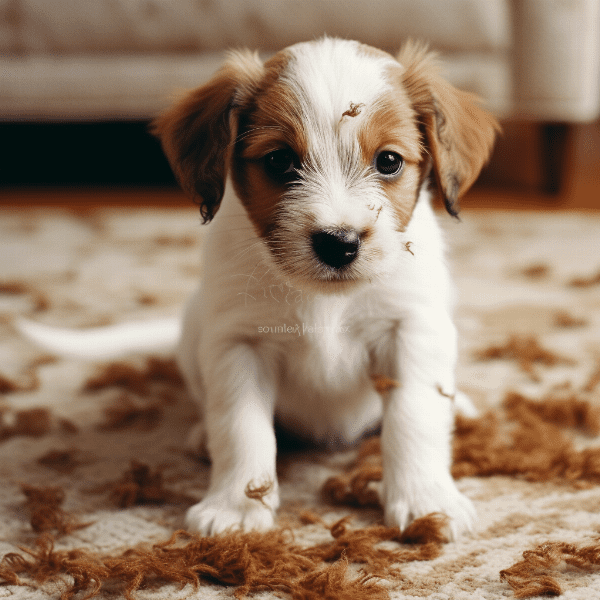
Supervising Your Puppy to Prevent Chewing
Supervising your puppy is an essential part of preventing destructive chewing. When you are not around, confine your puppy to a safe and secure area that is free from any items that may tempt them to chew, such as carpets or furniture.
Use a Crate or Playpen
A crate or playpen can provide a safe and comfortable space for your puppy to rest and play when you are not around. Make sure the crate or playpen is appropriately sized for your puppy and is equipped with comfortable bedding, toys, and water.
Monitor Your Puppy’s Behavior
When you are at home, keep a close eye on your puppy’s behavior and intervene immediately if you notice any signs of chewing. Redirect their attention to a chew toy or provide them with an appropriate alternative.
Avoid Punishing Your Puppy
Supervising your puppy is crucial in preventing destructive chewing behavior. By providing a safe and secure environment, monitoring their behavior, and using positive reinforcement, you can help your puppy learn good chewing habits and prevent damage to your carpets and other household items.
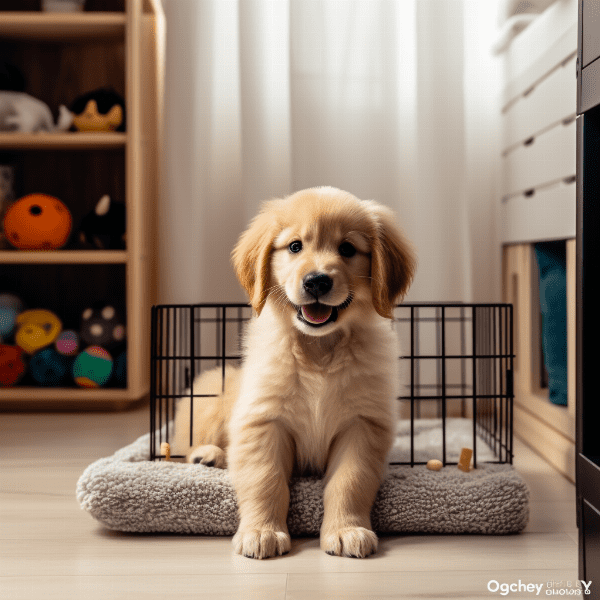
Providing Appropriate Chew Toys and Alternatives
Providing appropriate chew toys and alternatives is crucial in redirecting your puppy’s chewing behavior to appropriate items. Here are some tips for selecting appropriate chew toys and alternatives for your puppy:
Choose Safe and Durable Chew Toys
Select chew toys that are safe and durable for your puppy. Avoid toys that can be easily shredded or swallowed, as these can pose a choking hazard. Consider toys made of rubber or nylon, which are sturdy and safe for your puppy to chew on.
Provide a Variety of Textures and Flavors
Puppies may have different preferences when it comes to chew toys. Providing a variety of textures and flavors can help to keep your puppy interested and satisfied. Consider toys with different textures, such as knotted ropes, to provide your puppy with a variety of chewing experiences.
Rotate Toys Regularly
Rotating your puppy’s toys regularly can help to keep them interested and prevent boredom. Keep a few toys out at a time and switch them out every few days to keep things fresh and exciting.
Provide Appropriate Alternatives
If your puppy shows a preference for chewing on a particular item, such as carpets or furniture, provide appropriate alternatives to redirect their chewing behavior. For example, if your puppy likes to chew on furniture legs, provide them with a sturdy chew toy that is similar in shape and texture.
By providing your puppy with safe and appropriate chew toys and alternatives, you can redirect their chewing behavior to appropriate items and prevent damage to your carpets and furniture. Remember to always supervise your puppy when they are chewing and provide positive reinforcement when they chew on appropriate items.
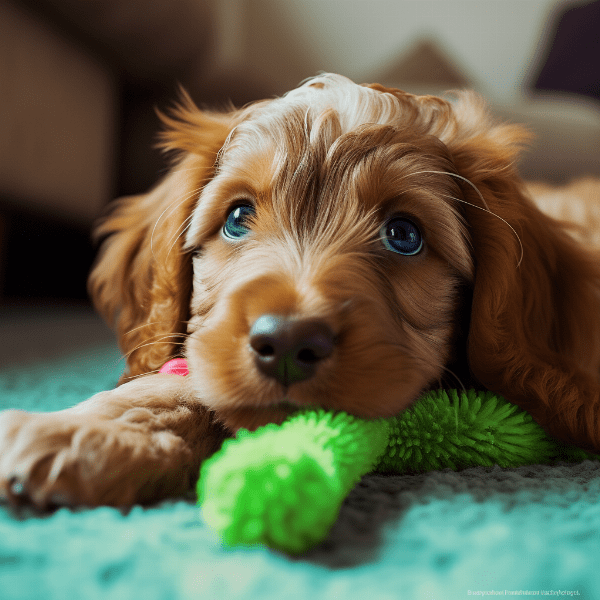
Using Deterrents and Repellents to Stop Chewing
Deterrents and repellents can be effective in Stopping your puppy from chewing on carpets and other household items. Here are some options to consider:
Bitter Apple Spray
Bitter apple spray is a safe and non-toxic spray that can be used on carpets and other items to deter your puppy from chewing. The bitter taste will discourage your puppy from chewing on the sprayed area.
Citrus Spray
Citrus spray is another effective deterrent that can be used to discourage your puppy from chewing. The scent of citrus is unpleasant to dogs and can be sprayed on carpets and other items to prevent chewing.
Tabasco Sauce
Tabasco sauce is another option for deterring your puppy from chewing. Apply a small amount of the sauce to the areas of the carpet that your puppy is chewing on. The spicy taste will discourage your puppy from chewing on the area.
Aluminum Foil
Aluminum foil can be used as a physical barrier to prevent your puppy from accessing certain areas. Simply place the foil over the carpet or other item that your puppy is chewing on to prevent access.
Using deterrents and repellents can be effective in stopping your puppy from chewing on carpets and other household items. However, it is important to note that these should be used in conjunction with positive reinforcement training and appropriate chew toys and alternatives. It is also important to choose non-toxic options that are safe for your puppy to use.
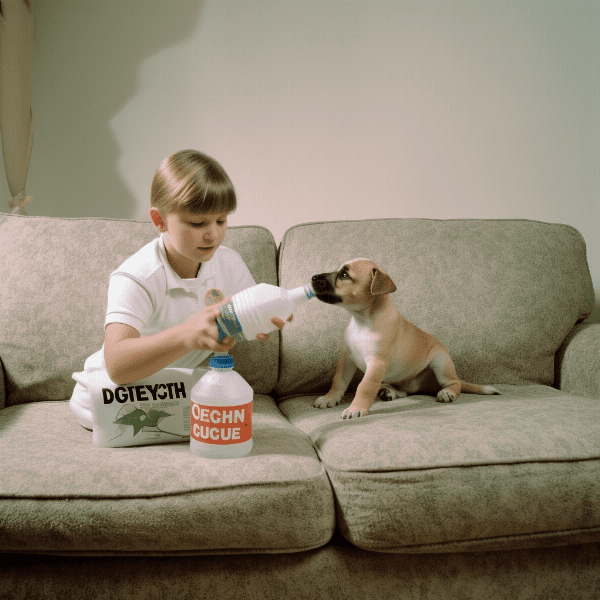
Positive Reinforcement Training for Good Behavior
Positive reinforcement training is an effective method for teaching your puppy good chewing behavior. Here are some tips for using positive reinforcement to stop your puppy from chewing on carpets:
Reward Good Behavior
When your puppy is chewing on appropriate items such as chew toys, bones, or other alternatives, reward them with treats, praise, and affection. This will help to reinforce good chewing behavior and encourage them to continue chewing on appropriate items.
Redirect Attention
If you catch your Puppy chewing on a carpet or other inappropriate item, redirect their attention to an appropriate chew toy or alternative. Reward them with treats and praise when they chew on the appropriate item.
.
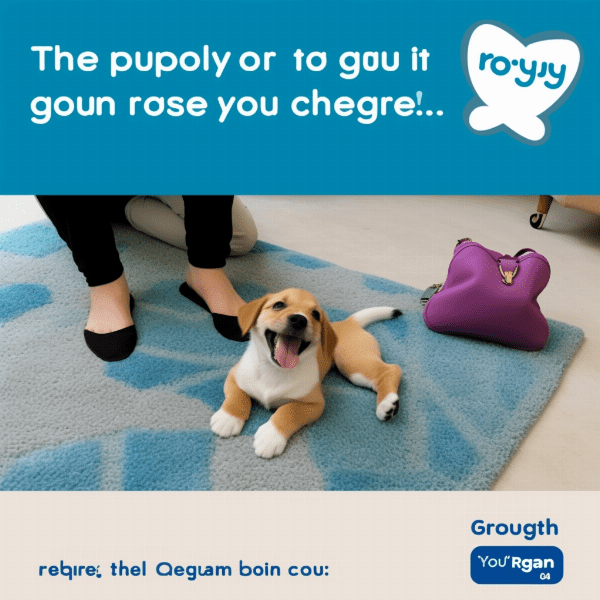
Managing Separation Anxiety in Puppies
Separation anxiety can cause destructive chewing behavior in puppies when they are left alone. Here are some tips for managing separation anxiety in puppies:
Gradual Desensitization
Gradual desensitization is a technique that can help to reduce separation anxiety in puppies. Start by leaving your puppy alone for short periods of time and gradually increase the duration over time. This can help your puppy get used to being alone and reduce their anxiety.
Provide Comfort and Security
Providing your puppy with a comfortable and secure environment can help to reduce their anxiety. Consider leaving them with a favorite toy, blanket, or piece of clothing that has your scent on it. This can help to provide comfort and reassurance while you are away.
Use Calming Music or Phrases
Playing calming music or leaving a recording of your voice can help to soothe your puppy and reduce their anxiety. This can provide a sense of comfort and familiarity while you are away.
Avoid Excessive Attention Before Leaving
Avoid giving your puppy excessive attention before leaving, as this can create an association between your departure and the attention they receive. Instead, remain calm and composed when leaving and returning home.
Consider Professional Help
If your puppy’s separation anxiety is severe and is causing destructive chewing behavior, consider seeking professional help from a certified dog trainer or behaviorist. They can provide effective solutions and help your puppy overcome their anxiety.
Managing separation anxiety in puppies can be challenging but is essential in preventing destructive chewing behavior. By using gradual desensitization, providing comfort and security, using calming music or phrases, avoiding excessive attention before leaving, and seeking professional help if needed, you can help your puppy overcome their anxiety and establish healthy chewing habits.
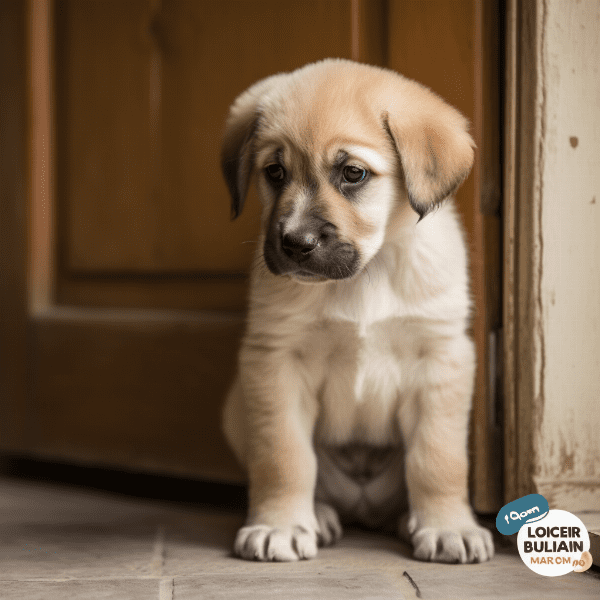
Consistency and Patience in Correcting Chewing Behavior
Correcting your puppy’s chewing behavior requires consistency and patience. Here are some tips for staying consistent and patient when correcting chewing behavior:
Set Clear Boundaries
Setting clear boundaries is crucial in correcting chewing behavior. Make sure your puppy knows which items are appropriate to chew on and which items are not. Consistently redirect their attention to appropriate items and avoid punishing them for chewing on inappropriate items.
Be Patient and Persistent
Correcting chewing behavior takes time and patience. Continue to redirect your puppy’s attention to appropriate items and consistently reward good behavior. Avoid becoming frustrated or giving up, as this may only delay progress.
Consistency is Key
Consistency is essential in correcting chewing behavior. Consistently supervise your puppy, redirect their attention to appropriate items, and provide positive reinforcement for good behavior. This will help to establish healthy chewing habits and prevent destructive behavior.
Avoid Reinforcing Negative Behavior
Avoid reinforcing negative behavior by punishing your puppy or providing attention when they are chewing on inappropriate items. Instead, consistently redirect their attention to appropriate items and reward good behavior.
Seek Professional Help if Needed
Correcting your puppy’s chewing behavior requires consistency, patience, and persistence. By setting clear boundaries, being patient and persistent, maintaining consistency, avoiding reinforcing negative behavior, and seeking professional help if needed, you can establish healthy chewing habits and prevent destructive behavior.
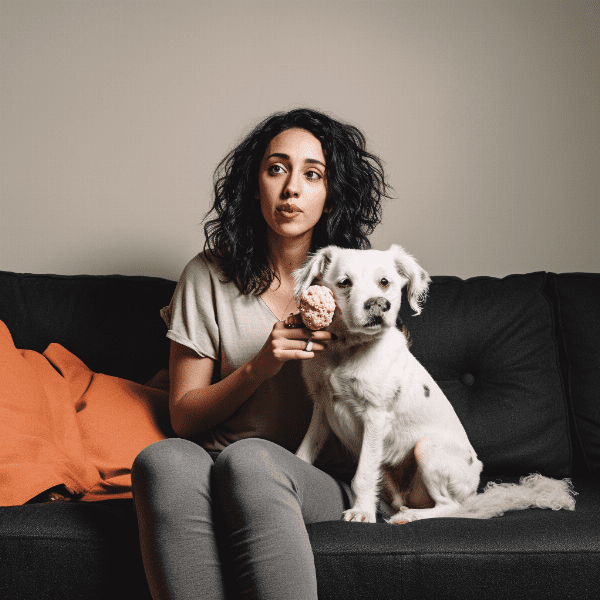
Seeking Professional Help if Needed
If your puppy’s chewing behavior is causing damage to your carpets or other household items and you have tried various methods to stop it without success, it may be time to seek professional help. Here are some situations where seeking professional help may be necessary:
Destructive Chewing Behavior
If your puppy’s chewing behavior is causing significant damage to your carpets, furniture, or other household items, it may be a sign of an underlying issue. A certified dog trainer or behaviorist can help identify the issue and provide effective solutions.
Aggressive Chewing Behavior
If your puppy’s chewing behavior is aggressive or dangerous, seek professional help immediately. Aggressive chewing behavior can be a sign of underlying issues such as anxiety, fear, or aggression.
Excessive Chewing Behavior
If your puppy’s chewing behavior is excessive and seems to be a compulsive behavior, seeking professional help is recommended. A behaviorist can help identify the cause of the behavior and provide effective solutions.
Separation Anxiety
If your puppy is exhibiting destructive chewing behavior when left alone due to separation anxiety, seeking professional help can be beneficial. A certified dog trainer or behaviorist can help identify the underlying issue and provide effective solutions for managing separation anxiety.
Seeking professional help when needed can be beneficial in identifying underlying issues and providing effective solutions for correcting chewing behavior in puppies. A certified dog trainer or behaviorist can provide customized solutions that are tailored to your puppy’s specific needs and help establish healthy chewing habits.
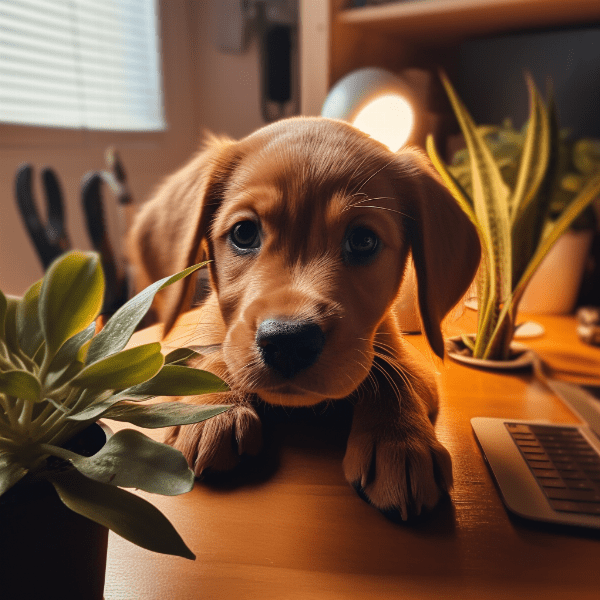
Protecting and Repairing Your Carpet from Damage
While working to correct your puppy’s chewing behavior, it’s important to take steps to protect and repair your carpet from damage. Here are some tips for protecting and repairing your carpet:
Use Area Rugs
Using area rugs can help to protect your carpet from damage. Place rugs in areas where your puppy tends to chew or play to create a safe and comfortable space for them to play.
Use Carpet Runners
Using carpet runners can also help to protect your carpet from damage. Place runners in high traffic areas such as hallways or entryways to provide a barrier between your puppy’s paws and your carpet.
Repair Damage Promptly
If your puppy does damage your carpet, repair it promptly to prevent further damage. Use a carpet repair kit or call a professional to repair the damage.
Consider Professional Cleaning
If your puppy’s chewing behavior has caused damage to your carpet, consider professional cleaning to remove any stains or odors. A professional carpet cleaning company can help to restore your carpet to its original condition.
Use Pet-Friendly Carpet Cleaners
When cleaning your carpet, use pet-friendly carpet cleaners that are safe for your puppy. Avoid using harsh chemicals that may cause harm to your puppy.
Taking steps to protect and repair your carpet from damage can help to prevent further damage and keep your home looking its best. By using area rugs and carpet runners, repairing damage promptly, considering professional cleaning, and using pet-friendly carpet cleaners, you can maintain a clean and comfortable home for you and your puppy.

Establishing a Healthy and Safe Environment for Your Puppy.
Establishing a healthy and safe environment for your puppy is essential for preventing destructive chewing behavior. Here are some tips for creating a safe and comfortable environment for your puppy:
Puppy-Proof Your Home
Puppy-proofing your home is essential in creating a safe environment for your puppy. Remove any items that may be hazardous or that your puppy may chew on, such as loose wires, toxic plants, or small objects.
Provide a Comfortable Sleeping Area
Providing a comfortable sleeping area for your puppy is important for their physical and emotional health. Choose a quiet and comfortable area for your puppy to sleep and provide a cozy bed or crate.
Provide Opportunities for Exercise and Play
Providing opportunities for exercise and play is important for your puppy’s physical and mental health. Take your puppy for regular walks and provide toys and games to keep them entertained and active.
Schedule Regular Vet Visits
Scheduling regular vet visits is important for maintaining your puppy’s health and preventing health issues that may lead to destructive chewing behavior. Regular check-ups and vaccinations can help to identify any potential health issues early on.
Provide a Nutritious Diet
Providing your puppy with a nutritious diet is essential for their overall health and well-being. Choose high-quality food that is appropriate for your puppy’s age, breed, and size.
By establishing a healthy and safe environment for your puppy, you can prevent destructive chewing behavior and promote their physical and emotional health. By puppy-proofing your home, providing a comfortable sleeping area, opportunities for exercise and play, scheduling regular vet visits, and providing a nutritious diet, you can create a safe and healthy environment for your puppy to thrive in.
